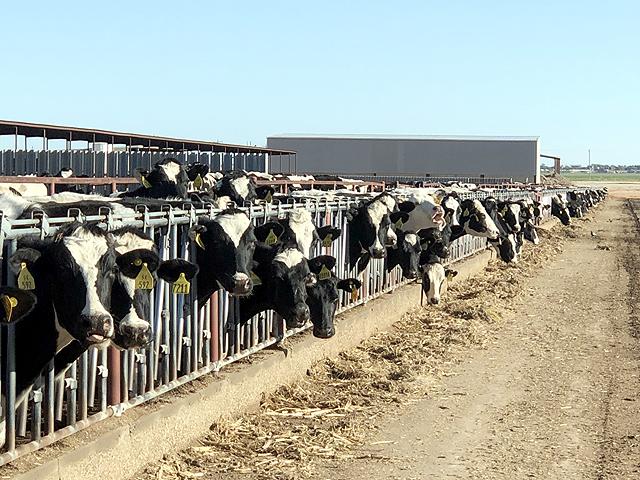Officials Confirm HPAI Dairy Infections
Dairies in Texas, Kansas Report Cattle Infected With Bird Flu
OMAHA (DTN) -- USDA and other federal agencies on Monday confirmed that an unknown number of dairy cattle in Texas and Kansas dairy farms have become sick with highly pathogenic avian influenza.
During the past two years, highly pathogenic avian influenza (HPAI) has led to infections and depopulation of more than 115 million chickens and turkeys in commercial and backyard poultry flocks. However, now HPAI appears to have jumped species to affect a small number of dairy herds in Southern and Plains states.
The Texas Department of Agriculture cited that "a mysterious disease has been working its way through the Texas Panhandle," before USDA officials identified the illness as a strain of HPAI. The Texas Department of Agriculture stated three dairies in the state had been affected.
The Kansas Department of Agriculture also reported that at least two commercial dairy operations were affected.
HIT PRIMARILY OLDER COWS
In a news release Monday, USDA stated the Food and Drug Administration, the Centers for Disease Control and Prevention, and state veterinarians and public health officials are investigating the illness that has recently hit "primarily older dairy cows in Texas, Kansas, and New Mexico that is causing decreased lactation, low appetite, and other symptoms."
While stating this is a "rapidly evolving situation," USDA stated there was no impact on human health, including milk or other dairy products.
USDA on Monday tested unpasteurized milk from sick cattle at two dairy farms in Kansas and one in Texas, as well as a swab from another Texas dairy that tested positive for highly pathogenic avian influenza (HPAI). USDA stated additional testing began last Friday and over the weekend because farms had reported deceased wild birds on their properties.
"Based on findings from Texas, the detections appear to have been introduced by wild birds," USDA stated.
P[L1] D[0x0] M[300x250] OOP[F] ADUNIT[] T[]
Texas has about 645,000 dairy cows, while New Mexico has 243,000 dairy cows and Kansas has 172,000 dairy cows.
USDA stated that initial testing by National Veterinary Services Laboratories has not found changes to the HPAI virus that would make it more transmissible to humans, which would indicate that the current risk to the public remains low.
Federal and state agencies are moving quickly to conduct additional testing for HPAI, as well as viral genome sequencing, so that we can better understand the situation, including characterization of the HPAI strain or strains associated with these detections.
NO CONCERN OF RISK TO CONSUMER HEALTH
At this stage, there is no concern about the safety of the commercial milk supply or that this circumstance poses a risk to consumer health, USDA stated.
Dairies are required to send only milk from healthy animals into processing for human consumption; milk from affected animals is being diverted or destroyed so that it does not enter the food supply. In addition, pasteurization has continually proven to inactivate bacteria and viruses, like influenza, in milk. Pasteurization is required for any milk entering interstate commerce.
"There is no threat to the public and there will be no supply shortages," said Texas Agriculture Commissioner Sid Miller. "No contaminated milk is known to have entered the food chain; it has all been dumped. In the rare event that some affected milk enters the food chain, the pasteurization process will kill the virus."
IMPACT ON FARMS
Officials did not state how many cattle were infected, but USDA stated about 10% of each of the dairy farms were infected "with little to no associated mortality reported among the animals."
Texas officials stated the cattle experienced flu-like symptoms including a fever and "thick and discolored milk" as well as a sharp reduction in their milk production. The dairies involved were losing as much as 40% of their milk production for seven to 10 days until symptoms subsided in the cattle.
"It is vital that dairy facilities nationwide practice heightened biosecurity measures to mitigate further spread," the Texas Department of Agriculture stressed.
Texas officials stated dairies should restrict access to essential personnel only, while disinfecting vehicles entering or leaving a farm, along with isolating affected cattle and destroying all contaminated milk. It's important to clean and disinfect all livestock watering devices and isolate any water that could have been contaminated by waterfowl.
Farmers are asked to notify their veterinarians if they suspect cattle in their herds are displaying symptoms.
Unlike poultry, Miller said he saw no need to depopulate the dairy herds. "Cattle are expected to fully recover. The Texas Department of Agriculture is committed to providing unwavering support to our dairy industry."
The Meat Institute also issued a news release stating that HPAI is not a health risk and "properly prepared beef is safe to eat and is not a food safety risk to humans."
In a separate situation, the Minnesota Board of Animal Health on Friday also reported that a goat kid (a juvenile goat) tested positive for HPAI on a farm where the poultry tested positive for HPAI. Other goats on the same farm also had tested positive for HPAI.
Chris Clayton can be reached at Chris.Clayton@dtn.com
Follow him on X, formerly known as Twitter, @ChrisClaytonDTN
(c) Copyright 2024 DTN, LLC. All rights reserved.



